By Leen Randell
Updated: Jul 04, 2024
10 Best Herbal Decoctions For Anxiety
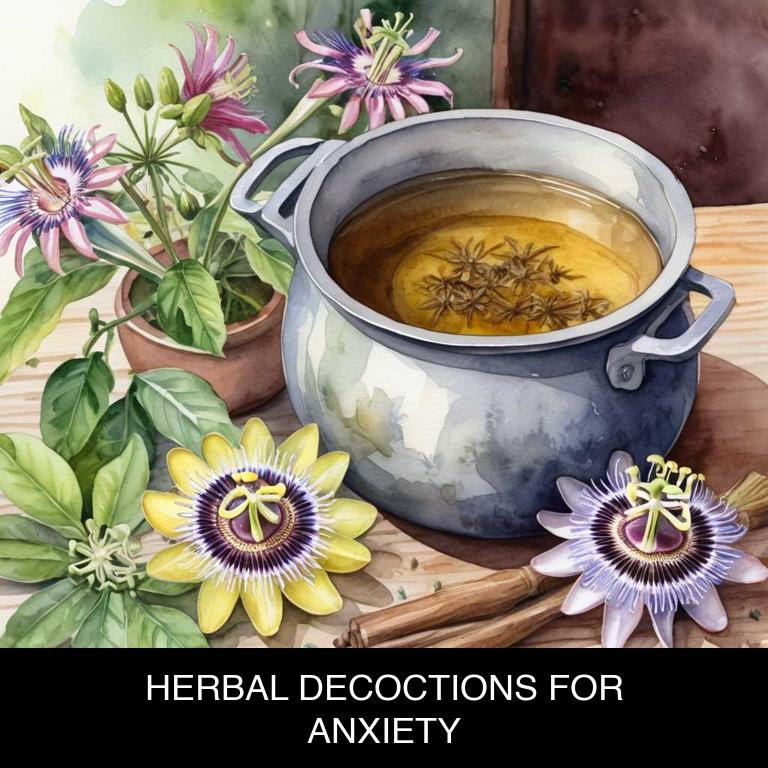
Herbal decoctions for anxiety are a natural and effective way to calm the mind and soothe the nervous system.
These concoctions are made by steeping herbs like chamomile, lavender, and lemon balm in hot water, releasing their therapeutic properties into a soothing liquid. Drinking these decoctions can help alleviate symptoms of anxiety such as restlessness and irritability, promoting relaxation and clarity of thought.
For example, a warm cup of chamomile tea before bed can improve sleep quality, while a morning brew of lemon balm can boost mood and energy levels throughout the day.
The following article describes in detail the most important decoctions for anxiety, including medicinal properties, parts of herbs to use, and recipes for preparations.
- 1. Passiflora incarnata
- 2. Piper methysticum
- 3. Lavandula angustifolia
- 4. Valeriana officinalis
- 5. Hypericum perforatum
- 6. Melissa officinalis
- 7. Tilia europaea
- 8. Ginkgo biloba
- 9. Avena sativa
- 10. Cichorium intybus
- What is the best combination of herbal decoctions to use for anxiety?
- What ailments similar to anxiety are treated with herbal decoctions?
1. Passiflora incarnata
Maypop decoctions helps with anxiety because of its unique combination of flavonoids, alkaloids, and saponins that work together to calm the nervous system.
The decoction's gentle sedative properties help to reduce feelings of overwhelm and hyperarousal, promoting a sense of relaxation and tranquility. Additionally, maypop contains apigenin, an antioxidant that binds to GABA receptors in the brain, further enhancing its anxiolytic effects.
As a result, maypop decoctions can be a natural and effective way to soothe anxiety and promote a sense of calm in individuals dealing with stress and anxiety-related disorders.
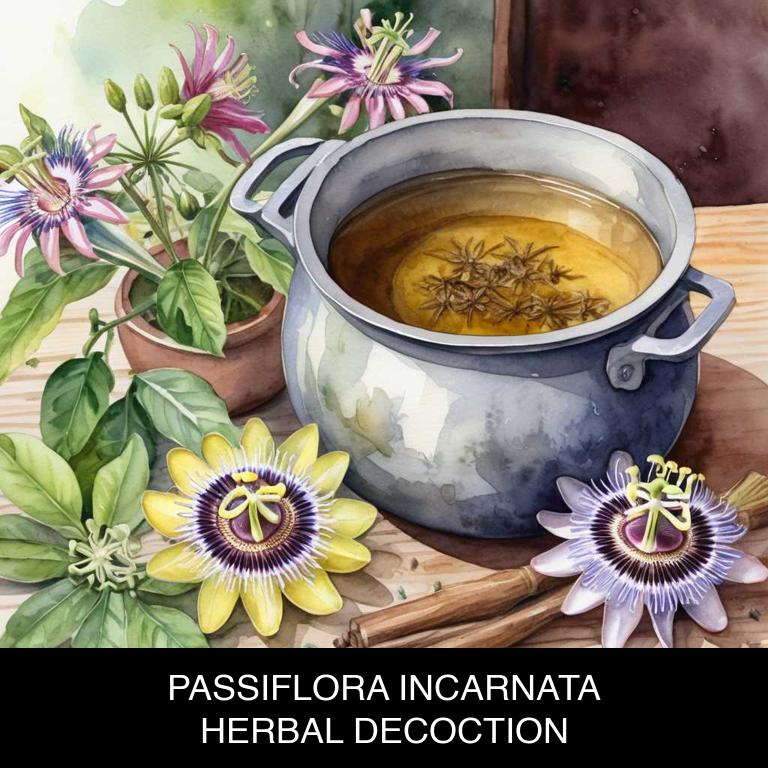
Medicinal Constituents
The list below shows the primary medicinal constituents in Passiflora incarnata decoctions that help with anxiety.
- Harmane: A tryptophan-derived alkaloid, harmane has a sedative effect on the nervous system, which helps to reduce anxiety by promoting relaxation and calmness.
- Isovitexin: A flavonoid glycoside, isovitexin has anxiolytic (anxiety-reducing) properties and may interact with neurotransmitters to modulate mood and reduce stress.
- Passiflorine: An alkaloid, passiflorine has a sedative and antispasmodic effect, which helps to calm the nervous system and reduce anxiety by inhibiting muscle tension and promoting relaxation.
Parts Used
The list below shows the primary parts of maypop used to make decoctions for anxiety.
- Leaves: They are used due to their high content of flavonoids and alkaloids, which contribute to their anxiolytic properties.
- Roots: They are used because they contain a higher concentration of bioactive compounds, including flavonoids and alkaloids, compared to other parts of the plant.
- Fruits: They are used due to their high content of vitamins and minerals, which may help alleviate anxiety symptoms.
Quick Recipe
The following recipe gives a procedure to make a basic maypop for anxiety.
- Gather 1-2 ounces of dried passiflora incarnata flowers and store them in a cool dry place.
- Combine the passiflora incarnata flowers with 8 ounces of boiling water in a heat-resistant cup.
- Steep the mixture for 5-10 minutes or until the liquid has cooled down to room temperature.
- Strain the liquid through a piece of cheesecloth or a fine-mesh sieve into a clean cup.
- Discard the solids and consume the liquid immediately or store it in the refrigerator for up to 24 hours.
2. Piper methysticum
Kava decoctions helps with anxiety because they possess a unique ability to calm the mind and body.
The active compounds in kava, such as kavalactones, interact with the brain's GABA receptors, promoting a sense of relaxation and reducing feelings of stress and unease. This calming effect allows individuals to better manage their emotions, leading to improved mood stability and reduced anxiety symptoms. Additionally, kava's sedative properties help quiet the mind, making it easier to fall asleep and stay asleep.
Overall, herbal kava decoctions provide a natural and effective way to alleviate anxiety symptoms.
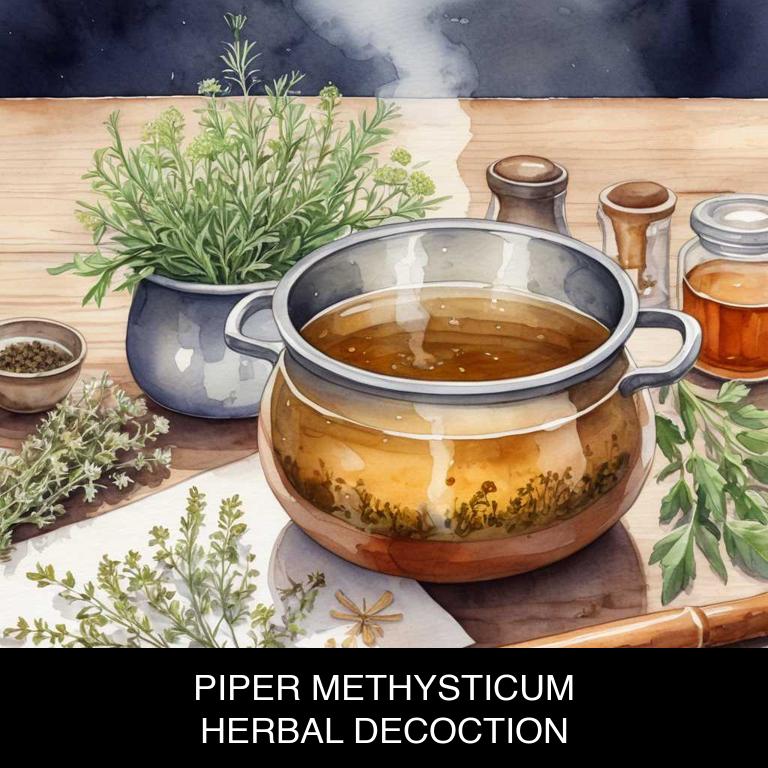
Medicinal Constituents
The list below shows the primary medicinal constituents in Piper methysticum decoctions that help with anxiety.
- Kavain: This lactone acts as a GABA receptor agonist, thereby increasing the inhibitory effects of GABA in the brain, which leads to a calming and anxiolytic effect.
- Dihydrokavain: Similar to kavain, DHK also acts as a GABA receptor agonist, but with a more potent effect. This contributes to its anxiolytic and sedative properties.
- Yasokavain: Although less studied than kavain and DHK, yasokavain has been shown to have anxiolytic effects through its action on GABA receptors, although the exact mechanisms may differ from those of kavain and DHK.
Parts Used
The list below shows the primary parts of kava used to make decoctions for anxiety.
- Roots: The roots are the most commonly used part for their high concentration of kavalactones, which are the active compounds responsible for Kava's anxiolytic effects.
- Leaves: Although less commonly used than roots and rhizomes, Kava leaves can also be used to make decoctions, although their kavalactone content may be lower.
Quick Recipe
The following recipe gives a procedure to make a basic kava for anxiety.
- Gather 20-30 grams of dried piper methysticum roots and 1 liter of boiling water.
- Steep the roots in the boiling water for 30 minutes to 1 hour.
- Strain the liquid through a cheesecloth or fine-mesh sieve into a clean container.
- Store the decoction in the refrigerator for up to 24 hours or freeze for longer storage.
- Take 100-200 milliliters of the decoction 2-3 times a day as needed.
3. Lavandula angustifolia
English lavender decoctions helps with anxiety because its calming properties soothe the nervous system, reducing feelings of tension and overwhelm.
The herb's sweet, floral scent also promotes relaxation by stimulating the brain's reward centers, releasing feel-good hormones like serotonin and dopamine.
As a result, herbal English lavender decoctions can help alleviate symptoms of anxiety, such as rapid heartbeat and restless thoughts, allowing individuals to unwind and find peace.
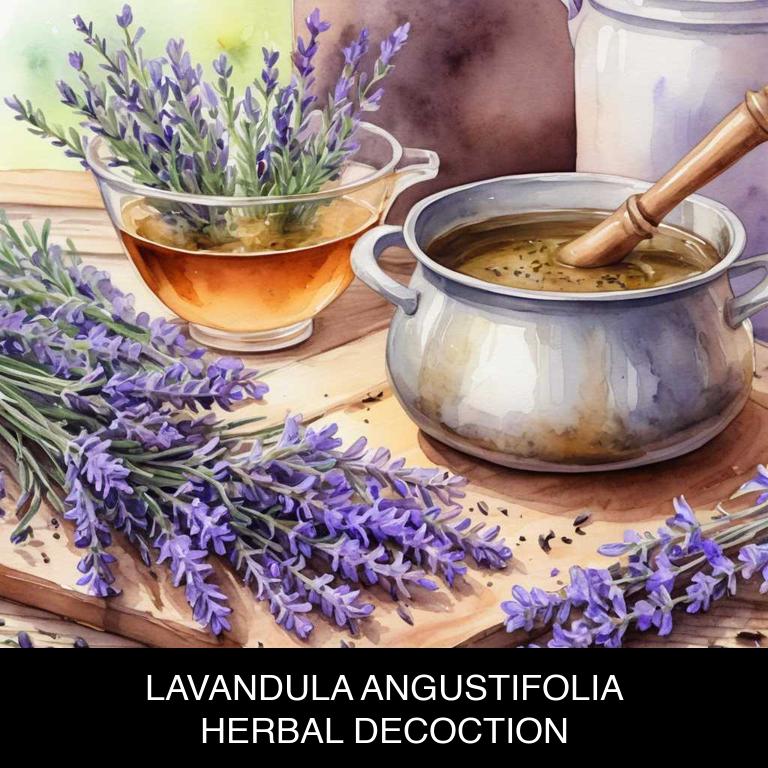
Medicinal Constituents
The list below shows the primary medicinal constituents in Lavandula angustifolia decoctions that help with anxiety.
- Linalool: A terpene that promotes relaxation and reduces anxiety by interacting with neurotransmitters and influencing the brain's GABA system, which helps to calm the nervous system.
- Linalyl acetate: A terpene that has a sedative effect and reduces anxiety by acting as a GABA receptor agonist, which helps to slow down brain activity and promote relaxation.
- Lavandulol: A terpene that has anxiolytic and sedative properties, which helps to reduce anxiety by influencing the brain's GABA system and promoting a sense of calm and relaxation.
Parts Used
The list below shows the primary parts of english lavender used to make decoctions for anxiety.
- Leaves: They contain bioactive compounds like linalool, which contribute to their calming and relaxing effects.
- Flowers: Rich in linalool and linalyl acetate, they are often used to promote relaxation and reduce anxiety.
- Seeds: Although less commonly used, the seeds of Lavandula angustifolia contain essential oils that may help alleviate anxiety symptoms.
Quick Recipe
The following recipe gives a procedure to make a basic english lavender for anxiety.
- Harvest 30-50 grams of fresh lavandula angustifolia flowers on a dry sunny morning for best quality.
- Dry the harvested flowers in a warm well-ventilated area for 1-2 weeks to preserve their potency.
- Combine 2-3 teaspoons of dried lavandula angustifolia flowers with 1 quart of boiling water to make a decoction.
- Steep the mixture for 5-7 minutes to allow the flowers to release their active compounds into the water.
- Strain the decoction through a cheesecloth or fine-mesh sieve to remove the flowers and discard the solids.
4. Valeriana officinalis
Valerian decoctions helps with anxiety because it possesses a unique ability to calm the mind and body.
The roots of the valerian plant contain compounds that interact with neurotransmitters, such as GABA, serotonin, and dopamine, which are responsible for regulating mood and emotions. By promoting relaxation and reducing stress hormones like cortisol, valerian decoctions can help alleviate symptoms of anxiety, including feelings of restlessness, irritability, and insomnia.
As a result, individuals can enjoy improved sleep quality, reduced worries, and increased sense of calmness in their daily lives.
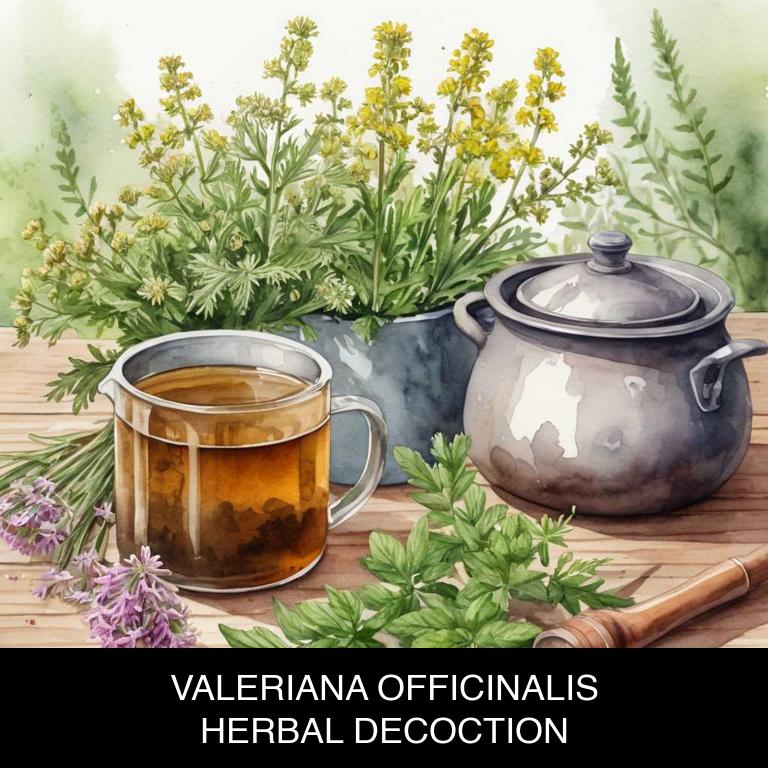
Medicinal Constituents
The list below shows the primary medicinal constituents in Valeriana officinalis decoctions that help with anxiety.
- Isovaleric acid: Acts as a GABA receptor agonist, increasing the activity of GABA (inhibitory neurotransmitter) which helps calm the nervous system and reduce anxiety.
- Valerenic acid: Binds to GABA receptors, promoting relaxation and reducing anxiety by increasing the activity of GABA.
- Valerenol: Has a sedative effect, which helps reduce anxiety by promoting relaxation and improving sleep quality.
Parts Used
The list below shows the primary parts of valerian used to make decoctions for anxiety.
- Roots: Valerian root is the most commonly used part for making decoctions due to its high concentration of valerenic acid, a compound responsible for its anxiolytic properties.
- Leaves: Valerian leaves contain a similar composition to the roots, making them a viable alternative for anxiety relief.
- Buds: Valerian buds are also used, particularly in traditional medicine, as they are believed to have a milder effect compared to the roots while still offering some anxiolytic benefits.
Quick Recipe
The following recipe gives a procedure to make a basic valerian for anxiety.
- Harvest 1 to 2 pounds of fresh or dried root material from mature plants in the fall.
- Clean and dry the root material to prevent contamination and spoilage.
- Chop the dried root material into small pieces to increase its surface area.
- Combine 1 teaspoon of chopped root with 1 cup of boiling water to create the decoction.
- Steep the mixture for 5 to 7 minutes to allow the active compounds to release.
5. Hypericum perforatum
St John's wort decoctions helps with anxiety because its active compounds, such as hyperforin and hypericin, have a natural calming effect on the nervous system.
The decoction can help to reduce symptoms of anxiety by promoting relaxation and improving mood. Additionally, St John's wort has been shown to increase the production of neurotransmitters like serotonin and dopamine, which play a crucial role in regulating emotional response.
By balancing these neurotransmitters, St John's wort decoctions may help alleviate feelings of overwhelm, worry, and stress associated with anxiety.
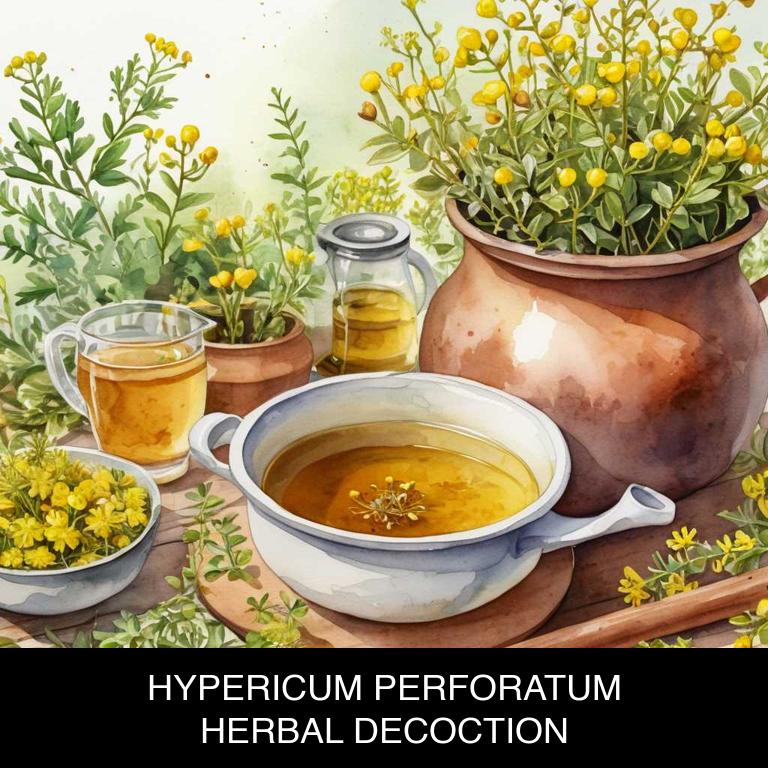
Medicinal Constituents
The list below shows the primary medicinal constituents in Hypericum perforatum decoctions that help with anxiety.
- Hyperforin: This prenylated phenol derivative acts as a serotonin reuptake inhibitor, which helps to increase serotonin levels in the brain, thereby reducing anxiety and improving mood.
- Hypericin: This naphthodianthrone is a potent inhibitor of the reuptake of serotonin, dopamine, and norepinephrine, helping to reduce anxiety by increasing the availability of these neurotransmitters in the brain.
- Flavonoids: Quercetin, a flavonoid present in Hypericum perforatum, has anti-inflammatory and antioxidant properties, which can help reduce oxidative stress and inflammation in the brain, contributing to anxiety relief.
Parts Used
The list below shows the primary parts of st john's wort used to make decoctions for anxiety.
- Leaves: They are used due to their high content of flavonoids and xanthones, which contribute to the plant's anxiolytic properties.
- Flowers: They are used because of their rich concentration of flavonoids, particularly hyperforin, which is known for its calming effects and anxiety relief.
- Roots: They are used due to their high concentration of hyperforin and other flavonoids, which are believed to contribute to the plant's anxiolytic and antidepressant properties.
Quick Recipe
The following recipe gives a procedure to make a basic st john's wort for anxiety.
- Gather 1 part of dried hypericum perforatum flowers and 8 parts of water in a large pot.
- Add 5-10 grams of dried flowers to 1 liter of water in the pot.
- Bring the mixture to a boil over high heat then reduce heat to a simmer.
- Let the decoction steep for 10-15 minutes then strain it through a cheesecloth or fine-mesh sieve.
- Store the resulting liquid in a glass container in the refrigerator for up to 24 hours.
6. Melissa officinalis
Lemon balm decoctions helps with anxiety because it contains rosmarinic acid, a compound that has been shown to have anxiolytic properties.
This natural herb has been traditionally used to calm the nervous system and reduce feelings of stress and worry. The decoction can also help to promote relaxation and improve sleep quality, which are often disrupted in individuals with anxiety.
By drinking lemon balm tea regularly, individuals can experience a sense of calm and tranquility, allowing them to better manage their anxiety symptoms.
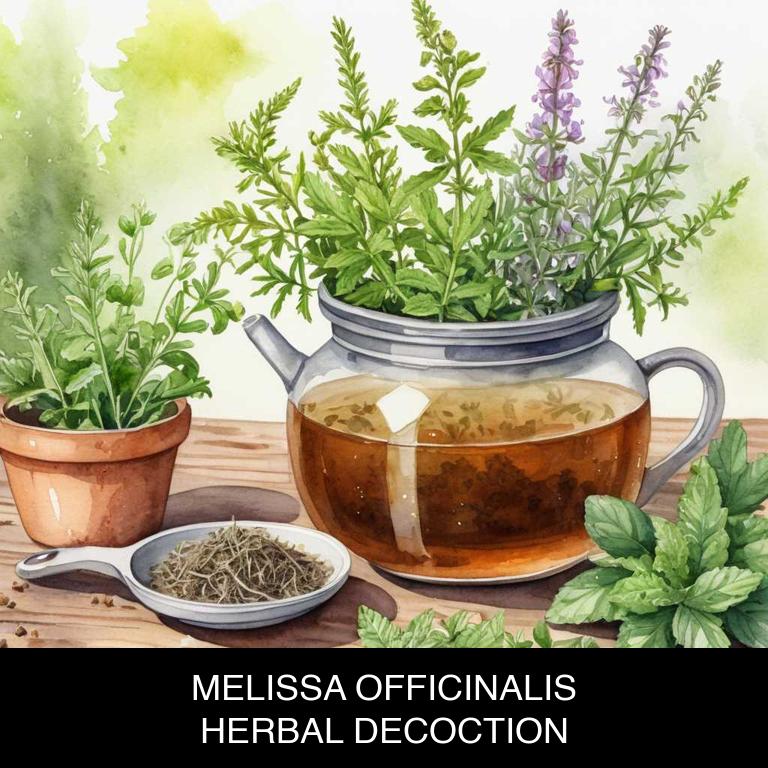
Medicinal Constituents
The list below shows the primary medicinal constituents in Melissa officinalis decoctions that help with anxiety.
- Rosmarinic acid: As a polyphenolic compound, rosmarinic acid has a calming effect by reducing stress and anxiety by modulating the body's stress response.
- Linalool: This terpene has a sedative and anxiolytic effect by interacting with the body's GABA receptors, promoting relaxation and reducing anxiety.
- Luteolin: As a flavonoid, luteolin exhibits anxiolytic properties by modulating the activity of neurotransmitters such as serotonin, dopamine, and GABA, which helps to alleviate anxiety and stress.
Parts Used
The list below shows the primary parts of lemon balm used to make decoctions for anxiety.
- Leaves: The leaves are the most commonly used part due to their high concentration of essential oils and active compounds, particularly linalool and linalyl acetate, which have anxiolytic properties.
- Stems: The stems are used due to their ability to retain the therapeutic properties of the leaves and provide a more sustainable source of the herb.
- Roots: The roots are used for their slightly different chemical composition, which is said to have a more sedative effect on the nervous system and promote relaxation.
Quick Recipe
The following recipe gives a procedure to make a basic lemon balm for anxiety.
- Gather melissa officinalis leaves in a quantity of 30 grams for a decoction to be used as a tea.
- Dry the melissa officinalis leaves in a well-ventilated area for 2-3 hours to reduce moisture content.
- Combine the dried melissa officinalis leaves with 1 liter of water in a saucepan.
- Boil the mixture for 5-10 minutes over medium heat then reduce heat to a simmer.
- Strain the decoction through a cheesecloth or a fine-mesh sieve into a cup or container.
7. Tilia europaea
Lime decoctions helps with anxiety because they contain flavonoids, which have a calming effect on the nervous system.
The citrus scent of lime also promotes relaxation and reduces stress levels by stimulating the release of serotonin, a neurotransmitter that helps regulate mood. Additionally, the antioxidant properties of lime help to reduce inflammation in the brain, which can contribute to feelings of anxiety and tension.
By soothing the mind and body, herbal lime decoctions provide a natural and effective way to alleviate symptoms of anxiety.
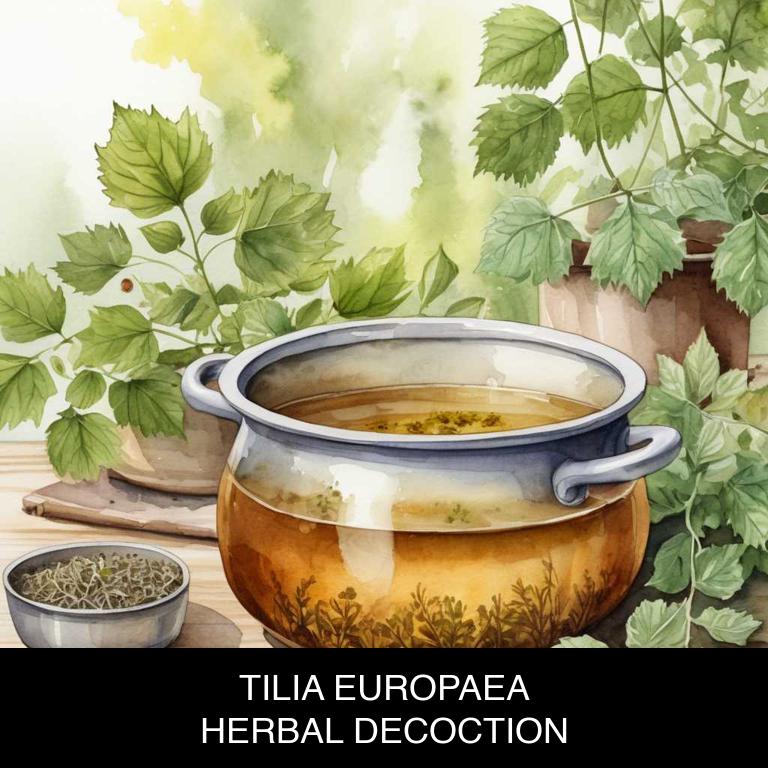
Medicinal Constituents
The list below shows the primary medicinal constituents in Tilia europaea decoctions that help with anxiety.
- Flavonoids: These compounds help alleviate anxiety by exerting a calming effect on the nervous system and reducing inflammation, which can contribute to anxiety symptoms.
- Triterpenoids: Ursolic acid has anti-anxiety and sedative properties, helping to reduce stress and promote relaxation, making it beneficial for anxiety relief.
- Phenolic acids: These phenolic acids exhibit antioxidant and anti-inflammatory effects, which can help mitigate anxiety-related inflammation and oxidative stress, promoting a sense of calm.
Parts Used
The list below shows the primary parts of lime used to make decoctions for anxiety.
- Leaves: Containing anxiolytic flavonoids, they help reduce anxiety by promoting relaxation and calming the nervous system.
- Buds: Rich in flavonoids and volatile oils, they contribute to reducing anxiety and promoting a sense of calm.
- Flowers: Acting as a natural sedative, they help alleviate anxiety by promoting relaxation and reducing stress.
Quick Recipe
The following recipe gives a procedure to make a basic lime for anxiety.
- Harvest fresh tilia europaea leaves and flowers in mid-summer when they are in full bloom.
- Dry the harvested plant material in a warm and well-ventilated area for 1-2 weeks.
- Measure out 2 teaspoons of dried tilia europaea flowers and 1 teaspoon of dried leaves per cup of water.
- Steep the dried plant material in boiling water for 5-7 minutes to create the decoction.
- Strain the decoction through a cheesecloth or a fine-mesh sieve into a clean container for use.
8. Ginkgo biloba
Maidenhair tree decoctions helps with anxiety because it contains compounds that have a calming effect on the nervous system.
The leaves of the maidenhair tree, specifically, are rich in flavonoids and saponins, which have been shown to possess anxiolytic properties. Drinking decoctions made from these leaves may help to reduce symptoms of anxiety by promoting relaxation and alleviating feelings of stress and tension.
As a result, individuals who consume maidenhair tree decoctions may experience improved mood and reduced anxiety levels over time.
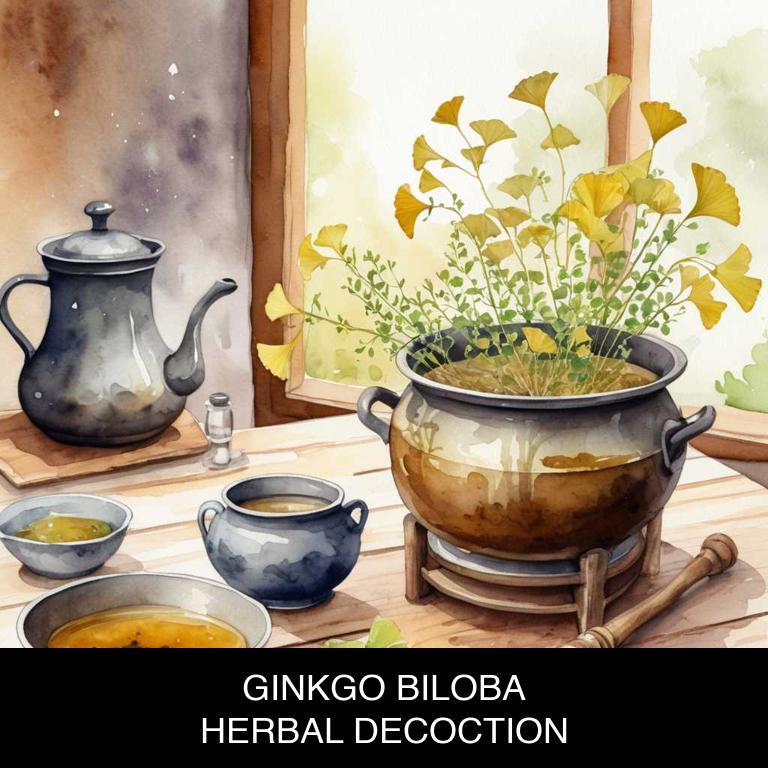
Medicinal Constituents
The list below shows the primary medicinal constituents in Ginkgo biloba decoctions that help with anxiety.
- Bilobalide: This triterpene lactone helps with anxiety by modulating GABA receptors and increasing the activity of neurotransmitters that promote relaxation, such as GABA and serotonin.
- Quercetin: As a flavonoid phenolic compound, quercetin has antioxidant properties and may help alleviate anxiety by reducing inflammation and promoting the health of neurons in the brain.
- Ginkgolide b: This sesquiterpene lactone acts as an antagonist to platelet-activating factor (PAF), a compound involved in anxiety and stress responses, thereby reducing anxiety-like behaviors.
Parts Used
The list below shows the primary parts of maidenhair tree used to make decoctions for anxiety.
- Leaves: The leaves of the Ginkgo biloba plant are the most commonly used part for making decoctions to alleviate anxiety due to their high concentration of flavonoids and terpenoids, which have a calming effect on the nervous system.
- Barks: The barks of the Ginkgo biloba plant are also used for making decoctions to help reduce anxiety, as they contain a compound called bilobalide, which has a sedative effect on the brain.
- Roots: Ginkgo biloba roots are used for making decoctions to help manage anxiety, as they contain a compound called ginkgolide, which has a sedative effect and helps to regulate the nervous system.
Quick Recipe
The following recipe gives a procedure to make a basic maidenhair tree for anxiety.
- Gather 4-8 ounces of dried ginkgo biloba leaves and stems and store them in a cool dry place.
- Weigh 2-4 grams of the dried ginkgo biloba leaves and stems and add them to a medium saucepan.
- Boil 4 cups of water in the saucepan and then reduce the heat to a simmer for 10-15 minutes.
- Strain the decoction through a cheesecloth or a fine-mesh sieve into a large bowl or container.
- Allow the decoction to cool and then refrigerate or freeze it for later use as needed.
9. Avena sativa
Oats decoctions helps with anxiety because they promote a sense of calmness and relaxation.
The soothing properties of oats, such as avenanthramides and beta-glucans, help to reduce inflammation in the body and calm the nervous system. This can lead to a decrease in symptoms of anxiety, including feelings of restlessness and irritability. Additionally, oats decoctions have been shown to improve sleep quality, which is often disrupted in individuals with anxiety disorders.
Overall, herbal oats decoctions offer a natural and effective way to alleviate anxiety symptoms.
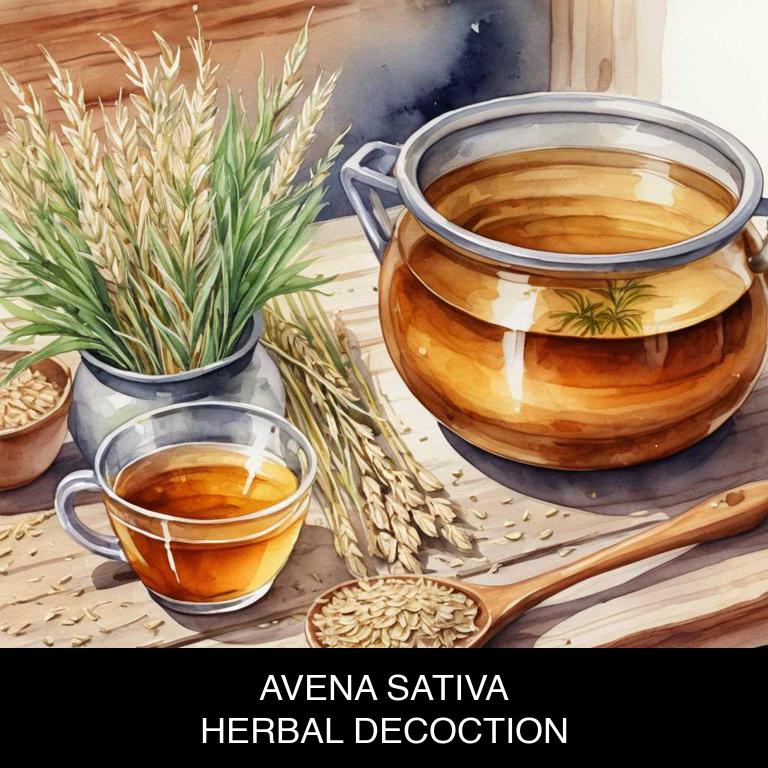
Medicinal Constituents
The list below shows the primary medicinal constituents in Avena sativa decoctions that help with anxiety.
- Isovitalexin b4: A flavonoid glycoside found in Avena sativa, which has been shown to possess anxiolytic properties by acting on the GABA receptor, thereby reducing anxiety and promoting relaxation.
- Avenacoside: A flavonoid glycoside responsible for Avena sativa's anxiolytic and sedative effects, which may be attributed to its ability to modulate neurotransmitter activity, particularly GABA, serotonin, and dopamine.
- Gamma-aminobutyric acid: A neurotransmitter found in Avena sativa that has a direct anxiolytic effect by reducing neuronal excitability and promoting a calming effect on the nervous system.
Parts Used
The list below shows the primary parts of oats used to make decoctions for anxiety.
- Roots: Avena sativa roots are commonly used to make decoctions for anxiety due to their high content of sesquiterpenes and other bioactive compounds that have anxiolytic properties.
- Seeds: Avena sativa seeds are used to make decoctions for anxiety due to their richness in omega-6 fatty acids and other nutrients that help regulate mood and reduce stress.
- Leaves: Avena sativa leaves are used to make decoctions for anxiety due to their high antioxidant content and the presence of flavonoids, which can help alleviate symptoms of anxiety.
Quick Recipe
The following recipe gives a procedure to make a basic oats for anxiety.
- Harvest 1 to 2 cups of avena sativa roots or stems from a trusted source.
- Chop the harvested avena sativa into small pieces to increase the surface area for extraction.
- Combine the chopped avena sativa with 4 cups of water in a saucepan and bring to a boil.
- Simmer the mixture for 10 to 15 minutes or until the liquid has reduced slightly and the flavors have melded.
- Strain the decoction through a cheesecloth or a fine-mesh sieve into a clean container to remove any solids.
10. Cichorium intybus
Chicory decoctions helps with anxiety because of its unique blend of flavonoids, phenolic acids, and sesquiterpenes, which work together to soothe the nervous system.
The calming effects of chicory can help reduce feelings of restlessness, worry, and apprehension, promoting relaxation and tranquility.
Additionally, chicory's natural sedative properties can gently calm an overactive mind, allowing individuals to focus on the present moment and quiet their racing thoughts.
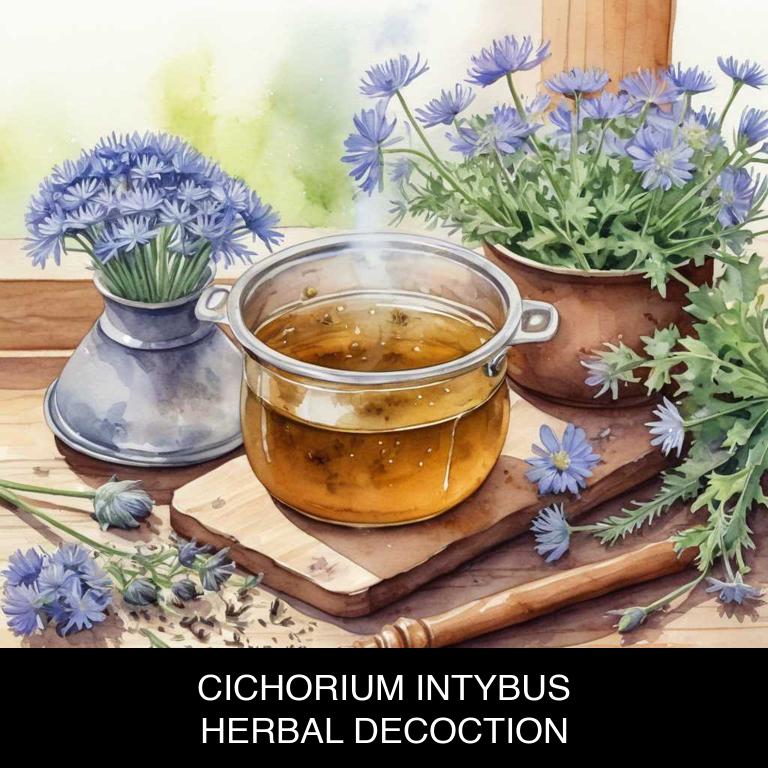
Medicinal Constituents
The list below shows the primary medicinal constituents in Cichorium intybus decoctions that help with anxiety.
- Luteolin: A flavonoid with anti-anxiety properties, luteolin helps reduce anxiety by modulating the activity of neurotransmitters such as GABA and serotonin in the brain.
- Kaempferol: A flavonoid with antioxidant and anti-inflammatory effects, kaempferol helps alleviate anxiety by reducing oxidative stress and inflammation in the brain, which can contribute to anxiety disorders.
- Ampelopsin: A flavonoid with sedative and anxiolytic properties, ampelopsin helps calm the nervous system and reduce anxiety by interacting with GABA receptors and reducing stress-induced anxiety.
Parts Used
The list below shows the primary parts of chicory used to make decoctions for anxiety.
- Roots: They are used to make decoctions for anxiety due to their high inulin content, which has a calming effect on the nervous system.
- Leaves: They are used to make decoctions for anxiety due to their flavonoid content, which acts as a natural sedative and stress-reliever.
- Flowers: They are used to make decoctions for anxiety due to their essential oil content, which has a calming and soothing effect on the mind and body.
Quick Recipe
The following recipe gives a procedure to make a basic chicory for anxiety.
- Gather 30 grams of dried cichorium intybus flowers and clean them thoroughly.
- Combine the cleaned flowers with 500 milliliters of boiling water and let it steep for 5 minutes.
- Strain the decoction through a cheesecloth or a fine-mesh sieve into a clean container.
- Discard the solids and store the decoction in the refrigerator for up to 24 hours.
- Consume 100 to 150 milliliters of the decoction 2 to 3 times a day as needed.
What is the best combination of herbal decoctions to use for anxiety?
The best combination of herbal decoctions that help with anxiety is a blend of chamomile, lavender, and lemon balm.
Chamomile soothes the nervous system and calms the mind, while lavender promotes relaxation and reduces stress. Lemon balm, a natural adaptogen, helps regulate emotions and alleviate anxiety symptoms. When brewed together, these herbs create a tranquil and balancing effect, promoting deep relaxation and reducing anxiety levels.
This combination can be consumed as a tea or infused in a warm bath for a calming and rejuvenating experience.
What ailments similar to anxiety are treated with herbal decoctions?
Ailments similar to anxiety/decoctions.html">anxiety/decoctions.html">anxiety that are treated with herbal decoctions are stress, insomnia, and depression.
Herbal remedies such as chamomile, lavender, and passionflower are commonly used to calm the nervous system and promote relaxation.
Decoctions made from these herbs can help alleviate symptoms of restlessness, irritability, and fatigue associated with these conditions, promoting a sense of balance and well-being.